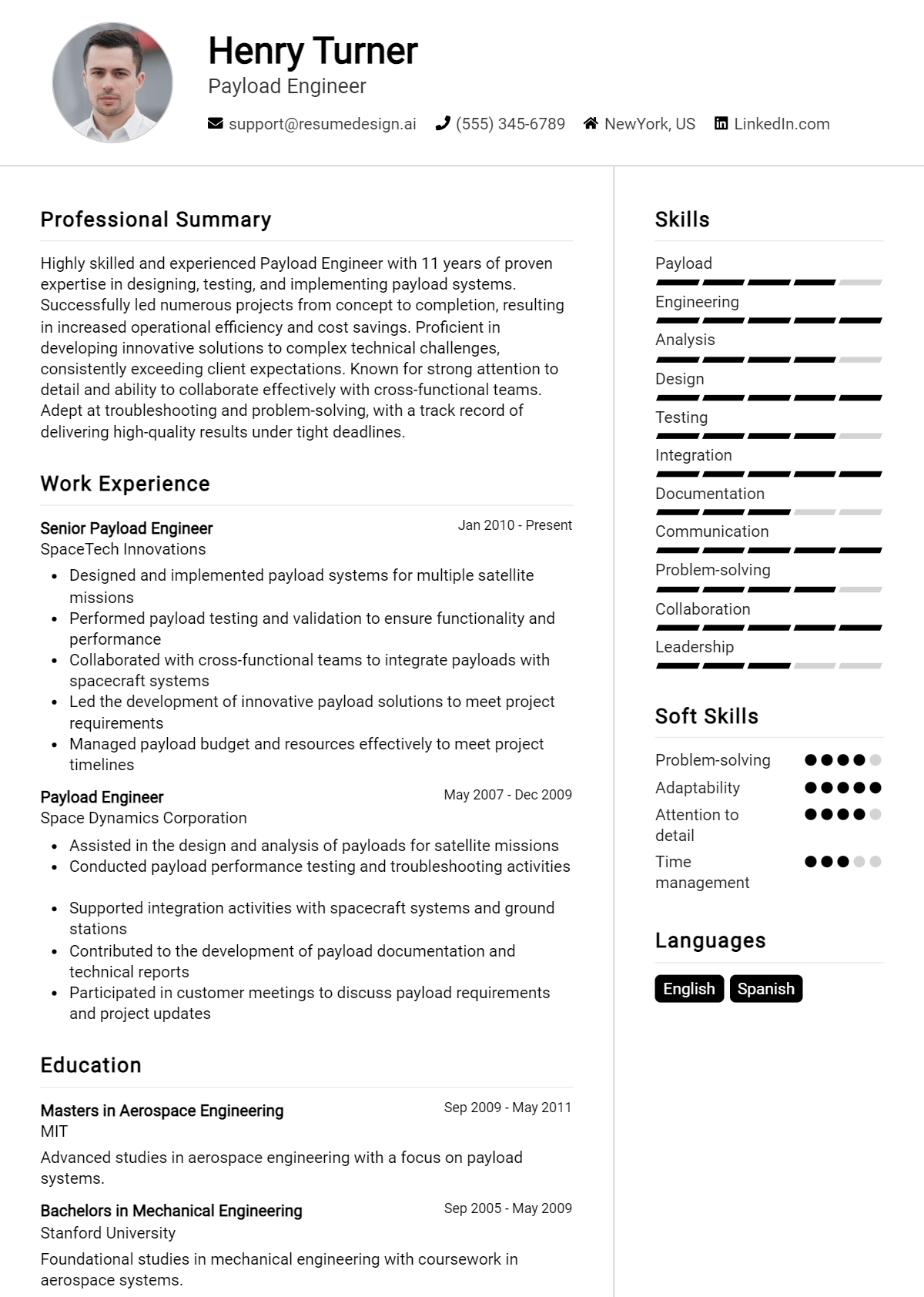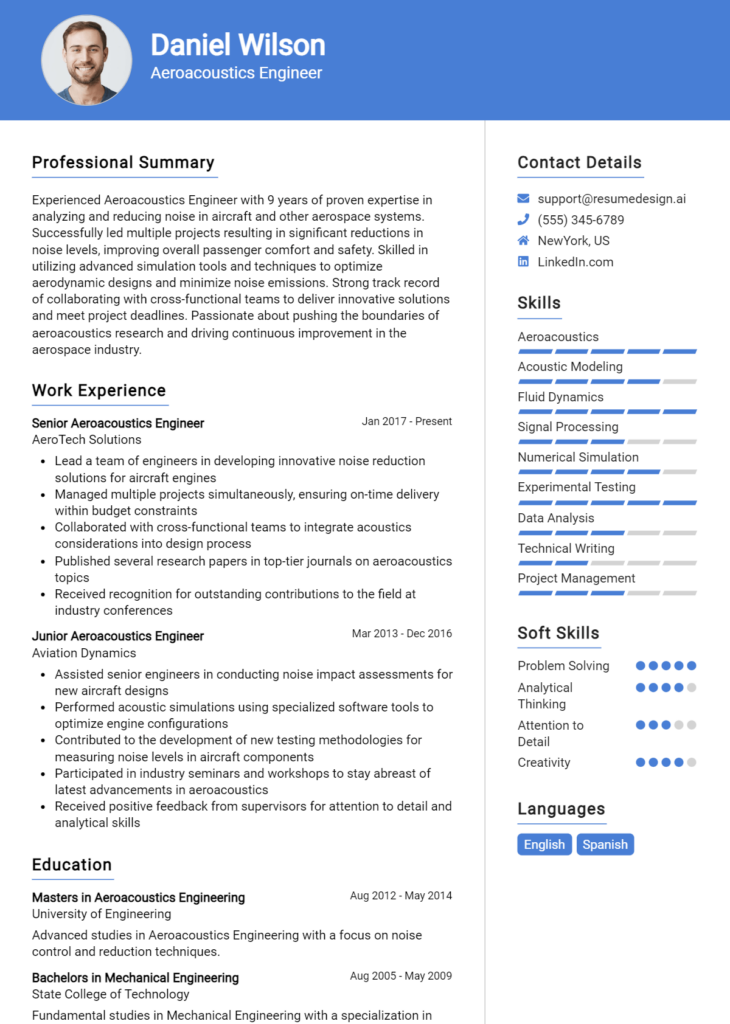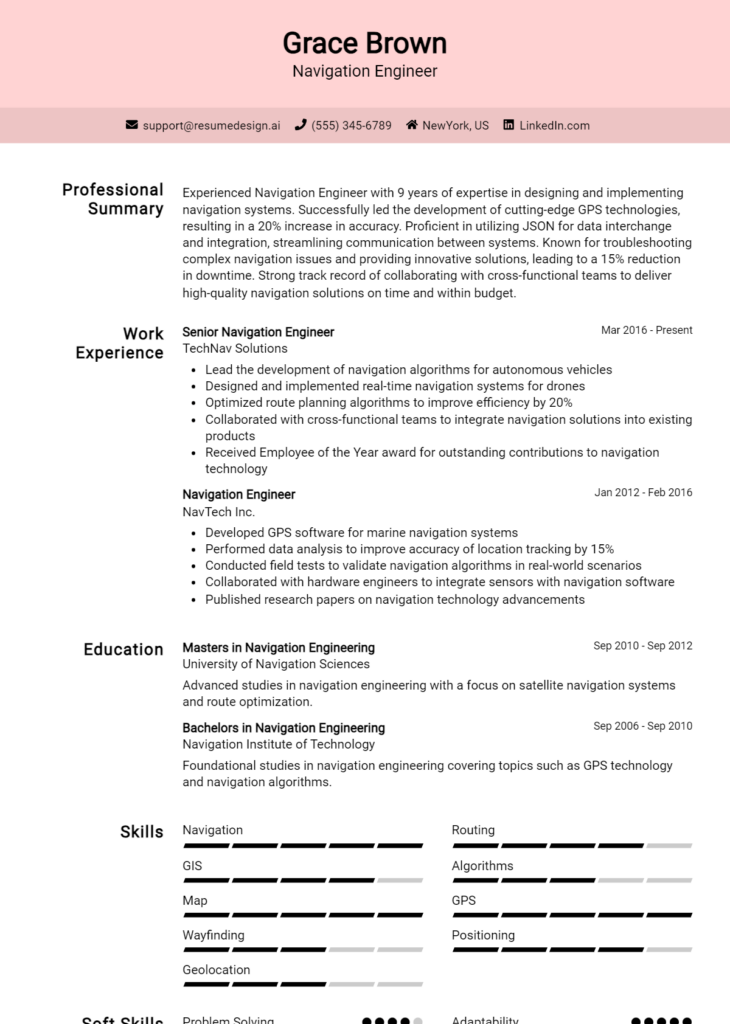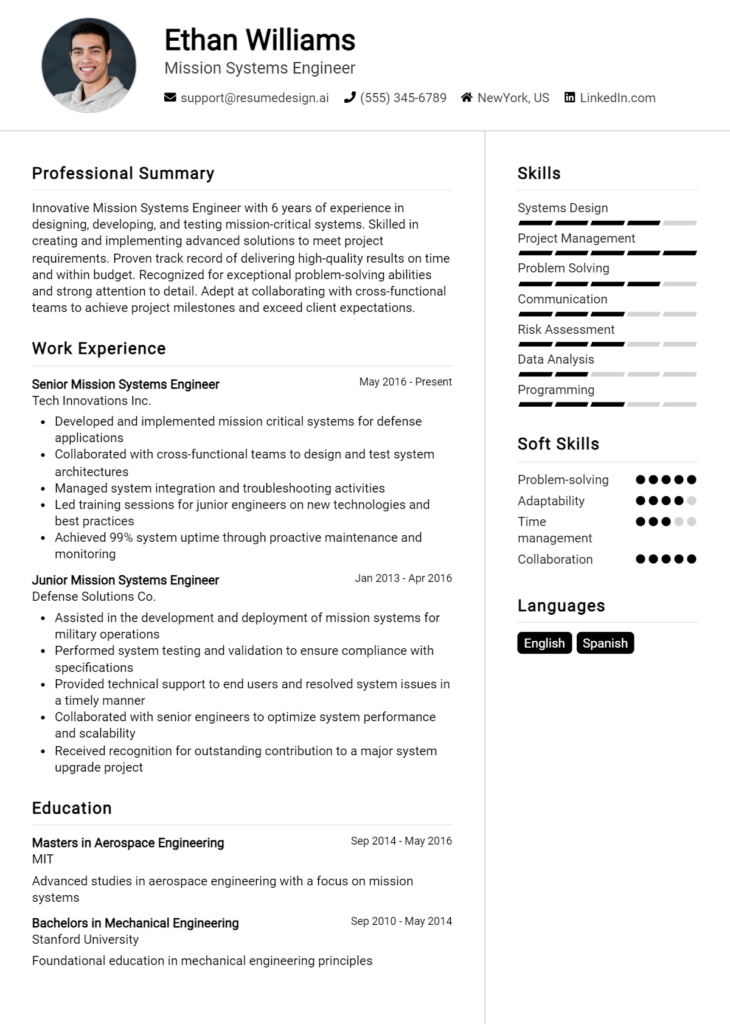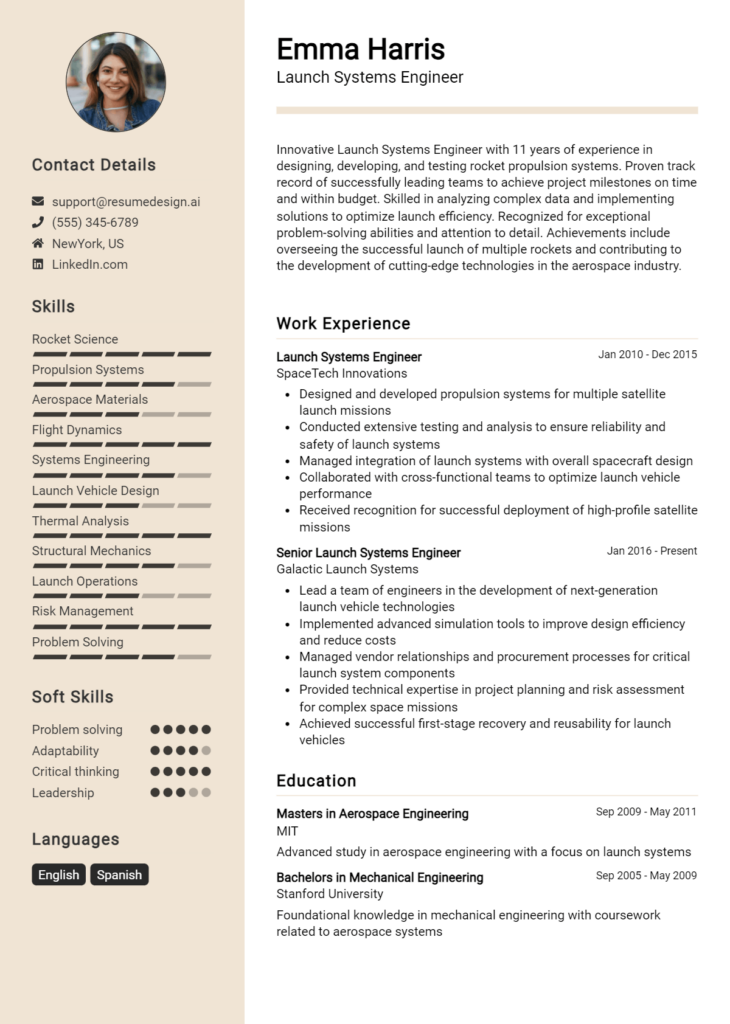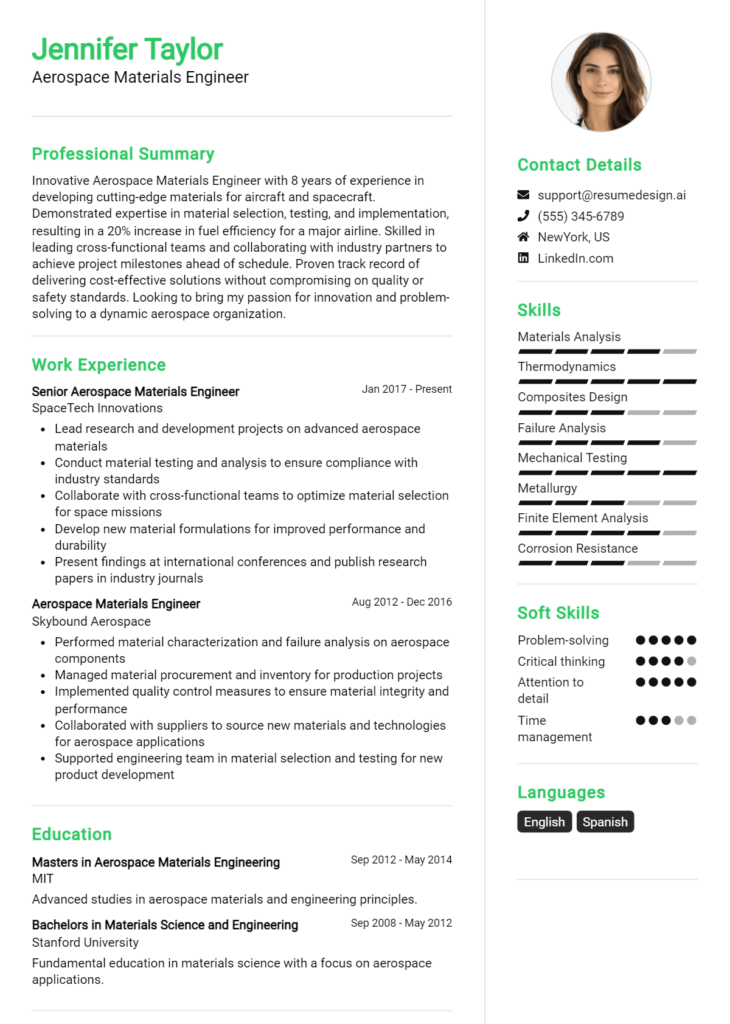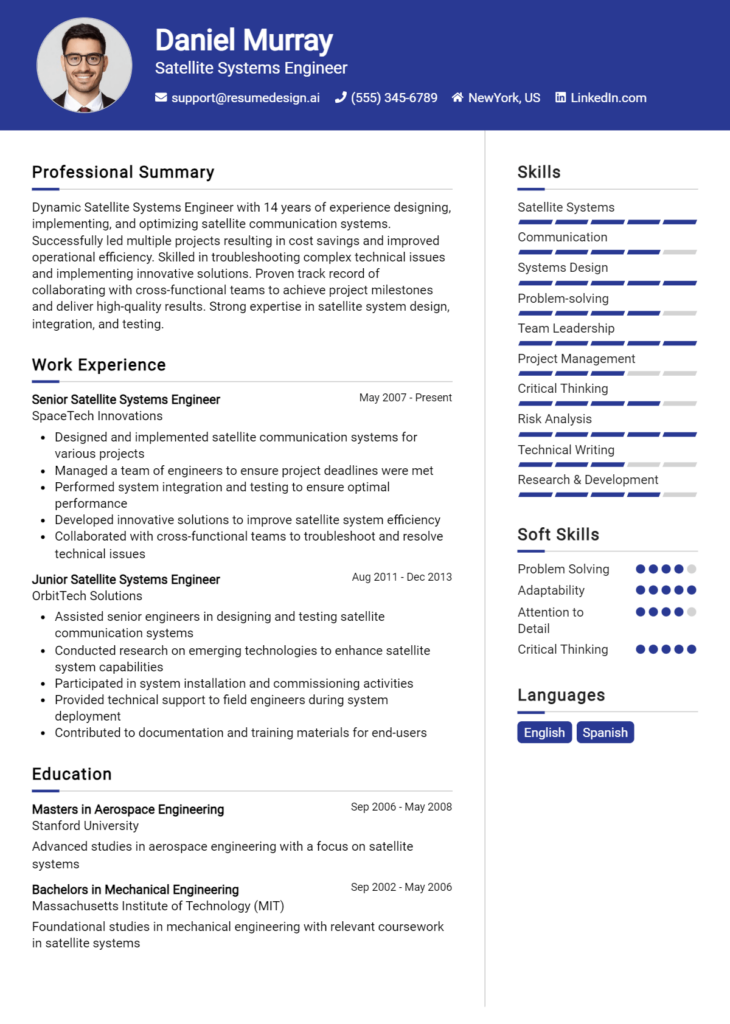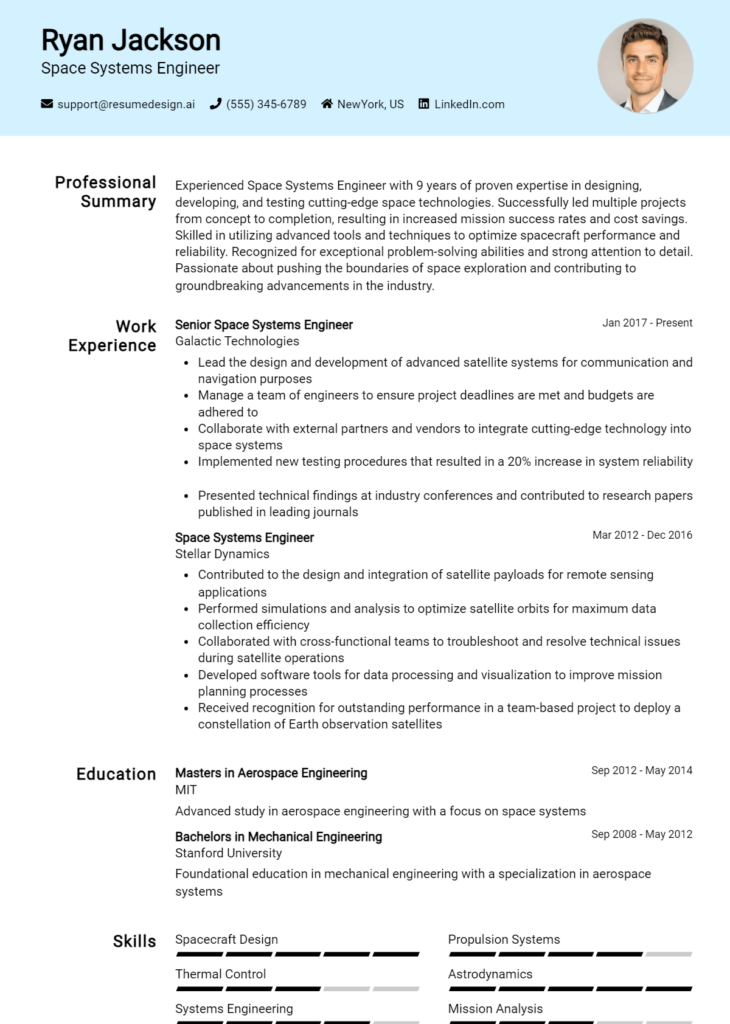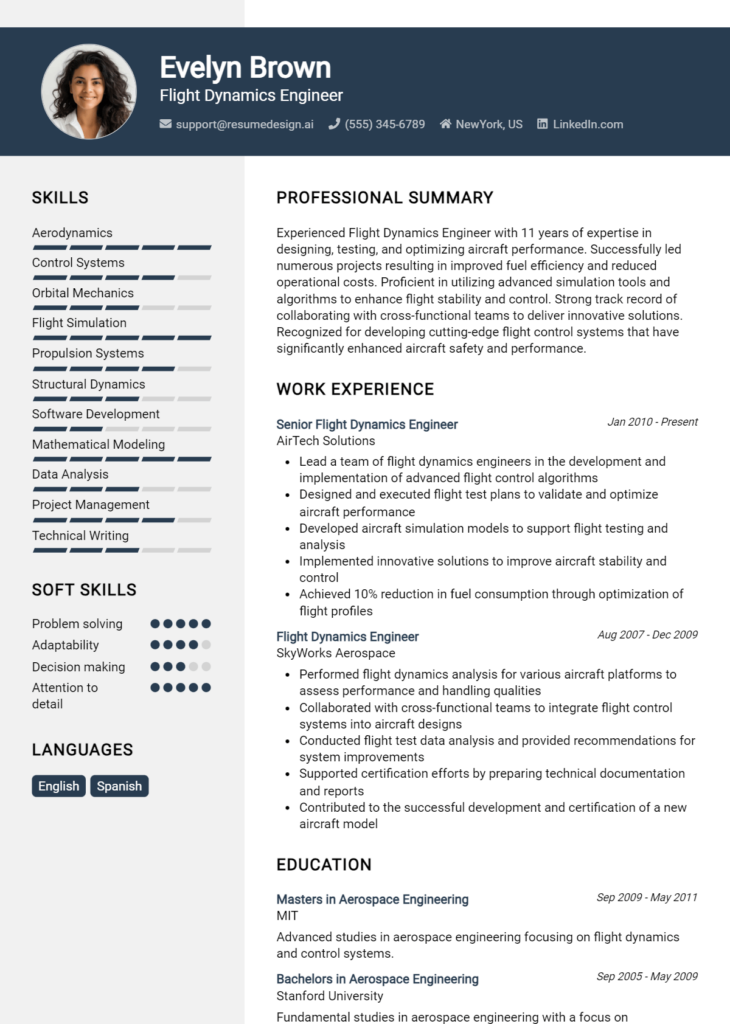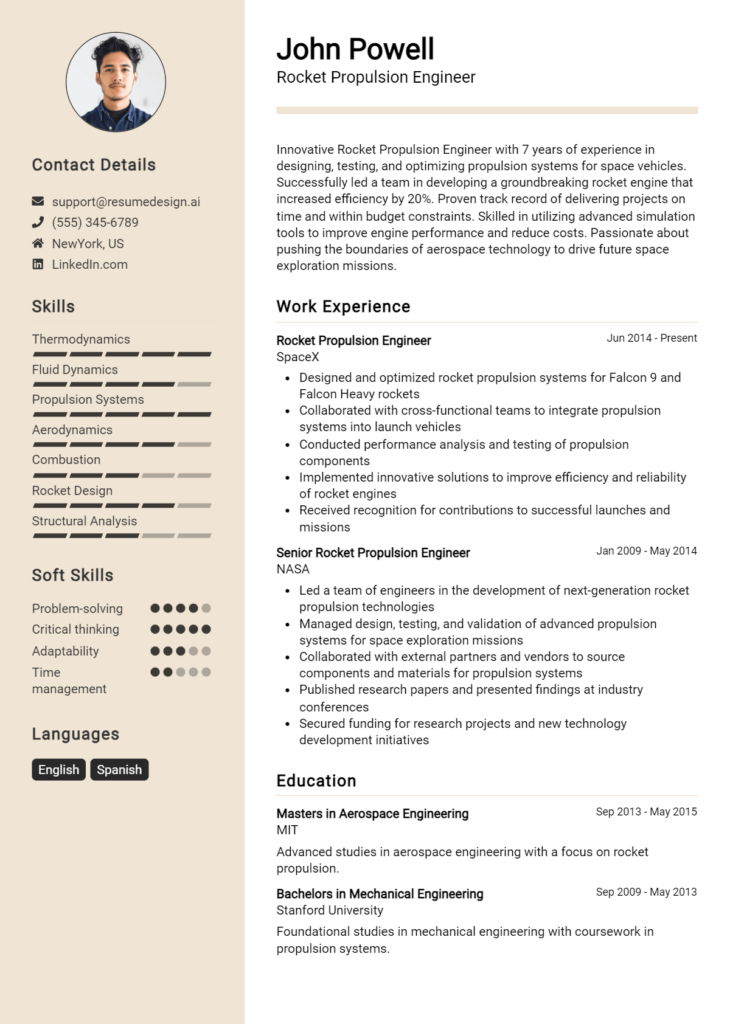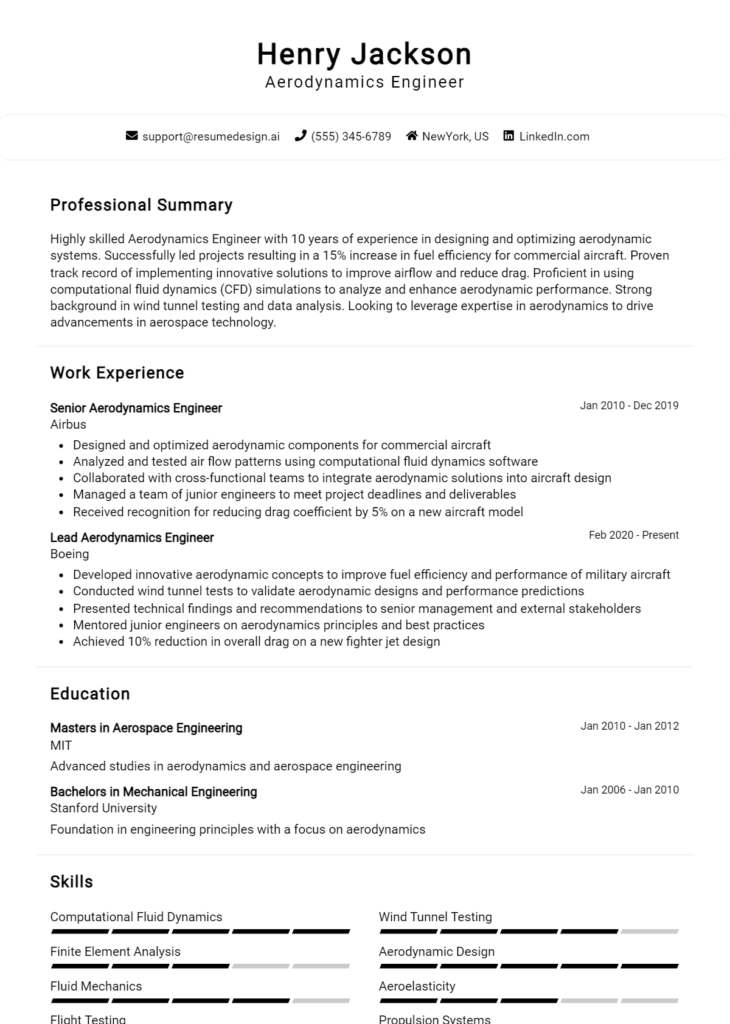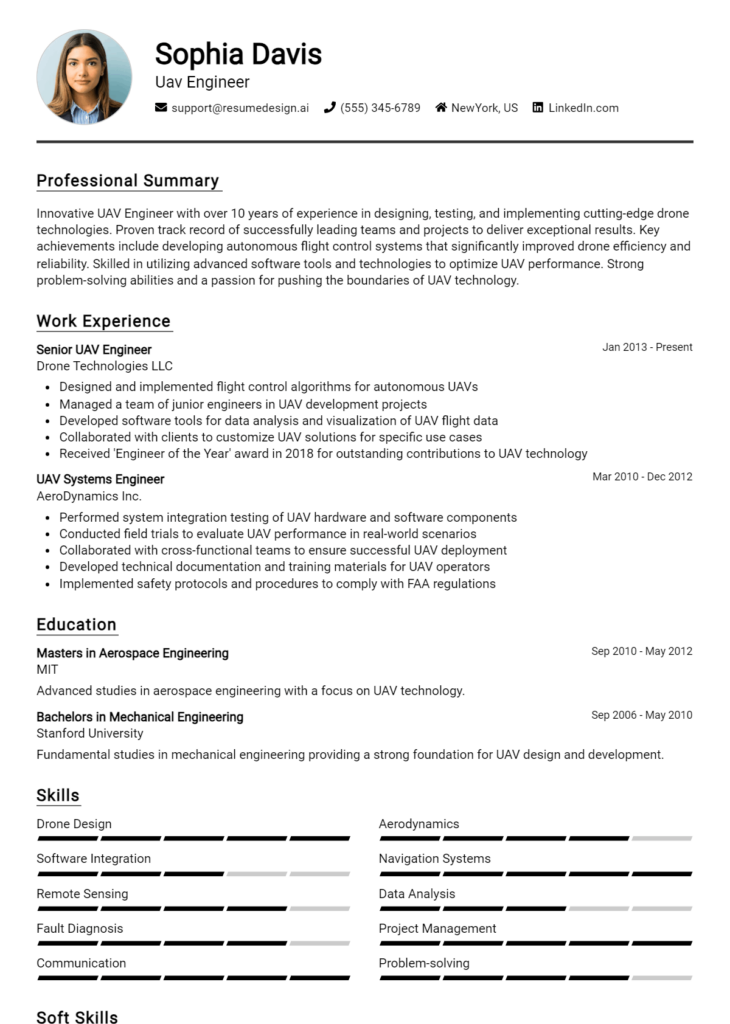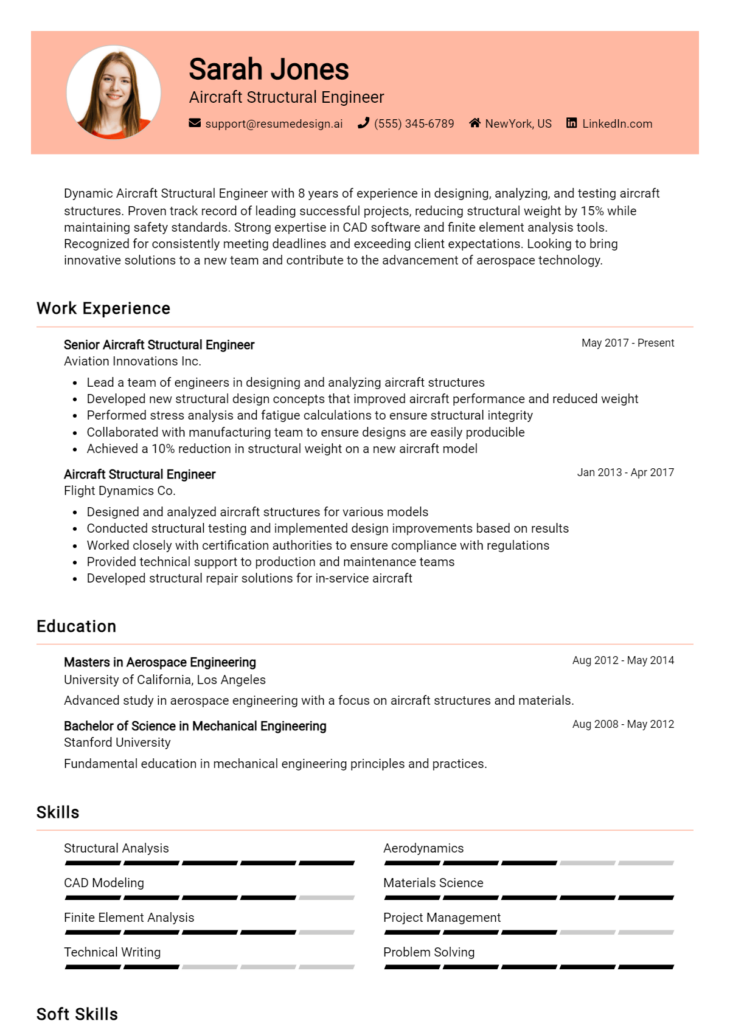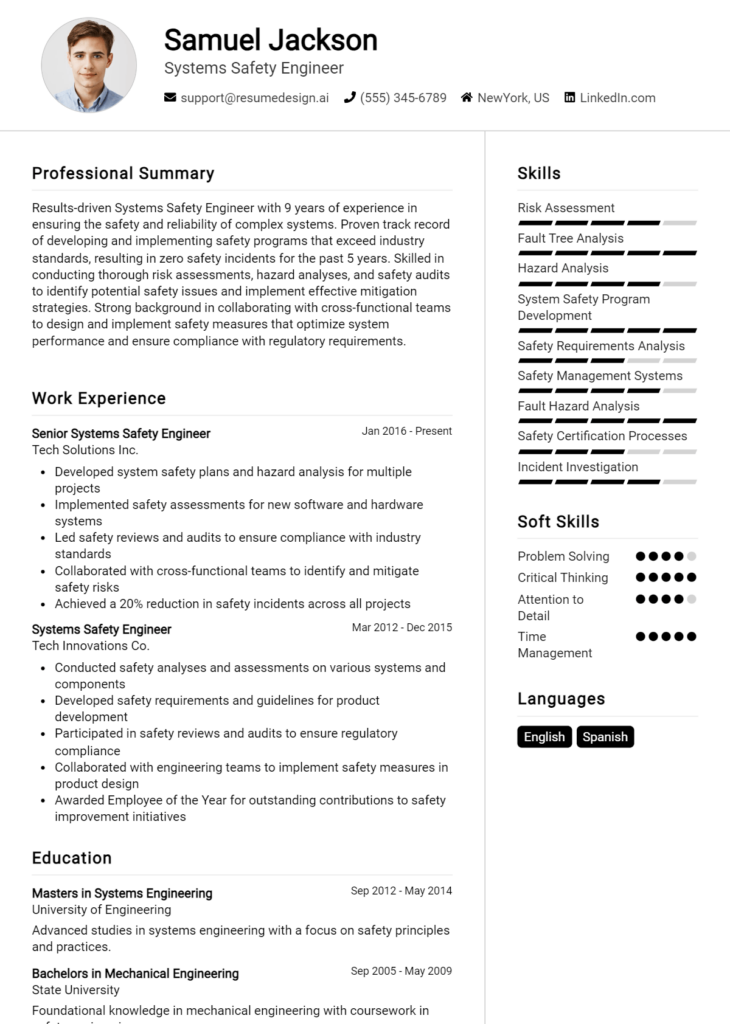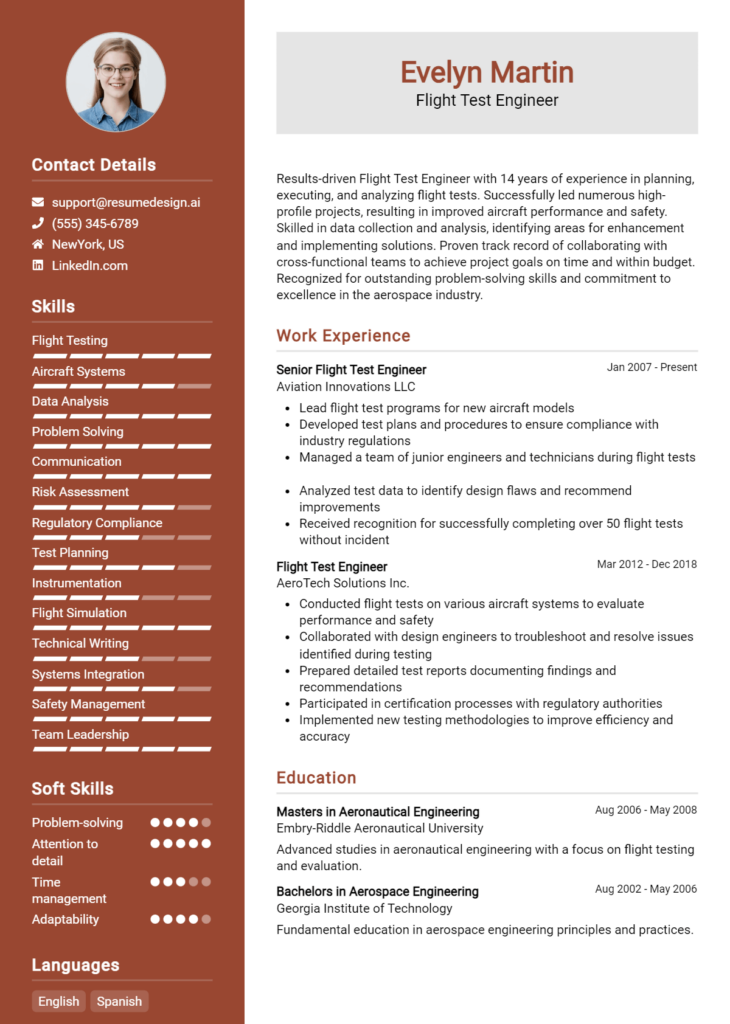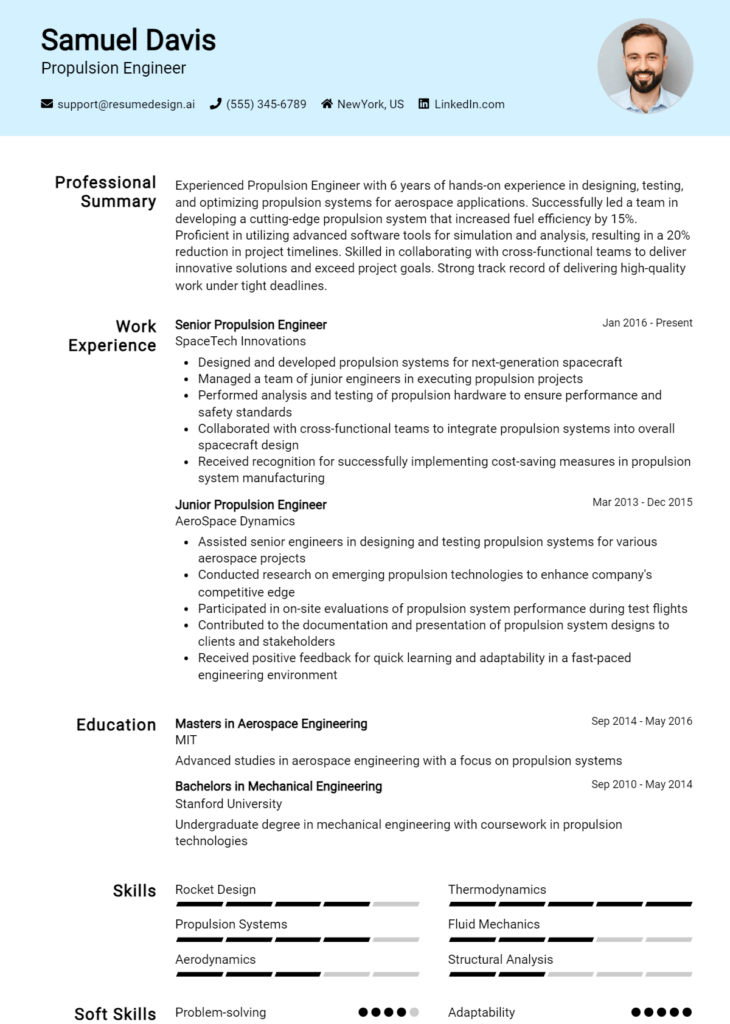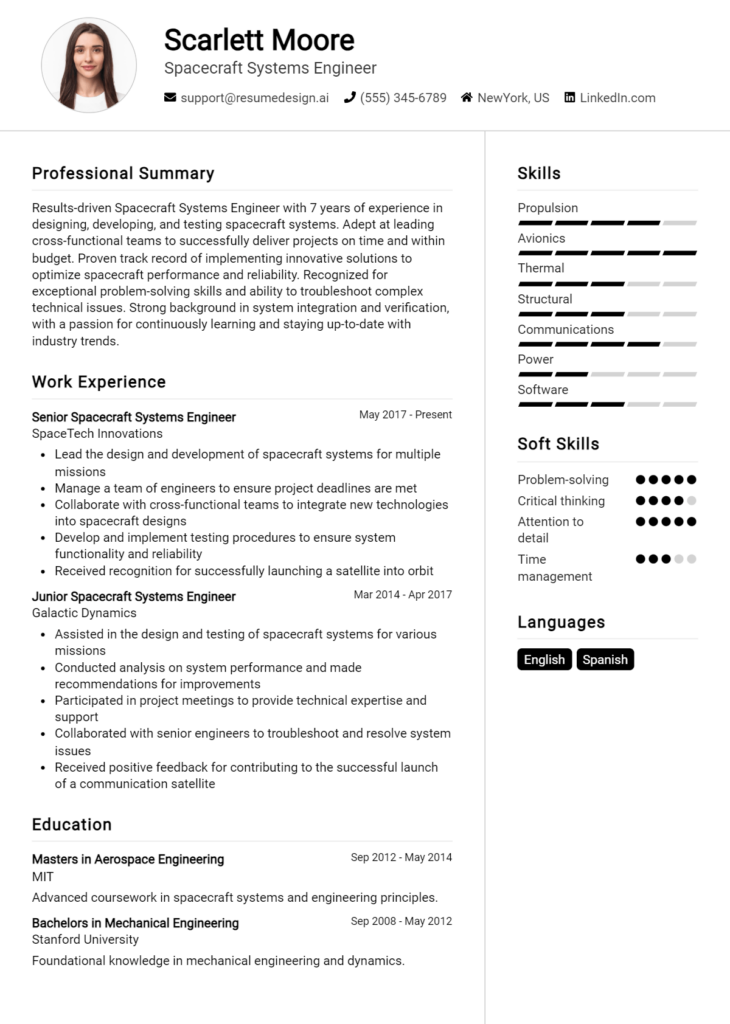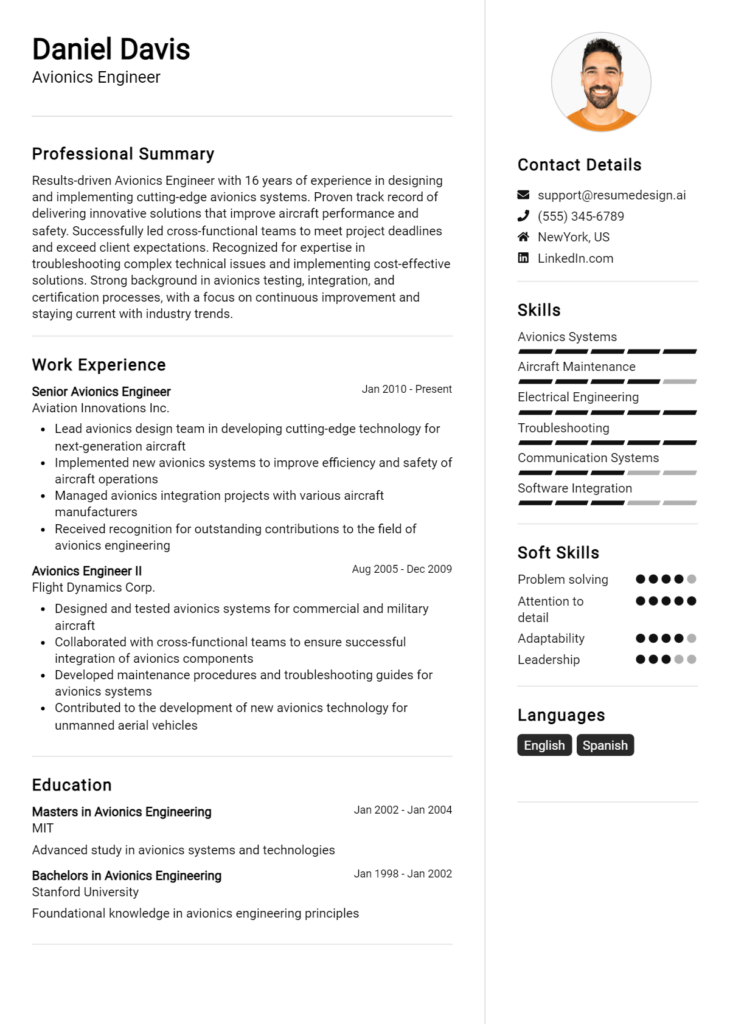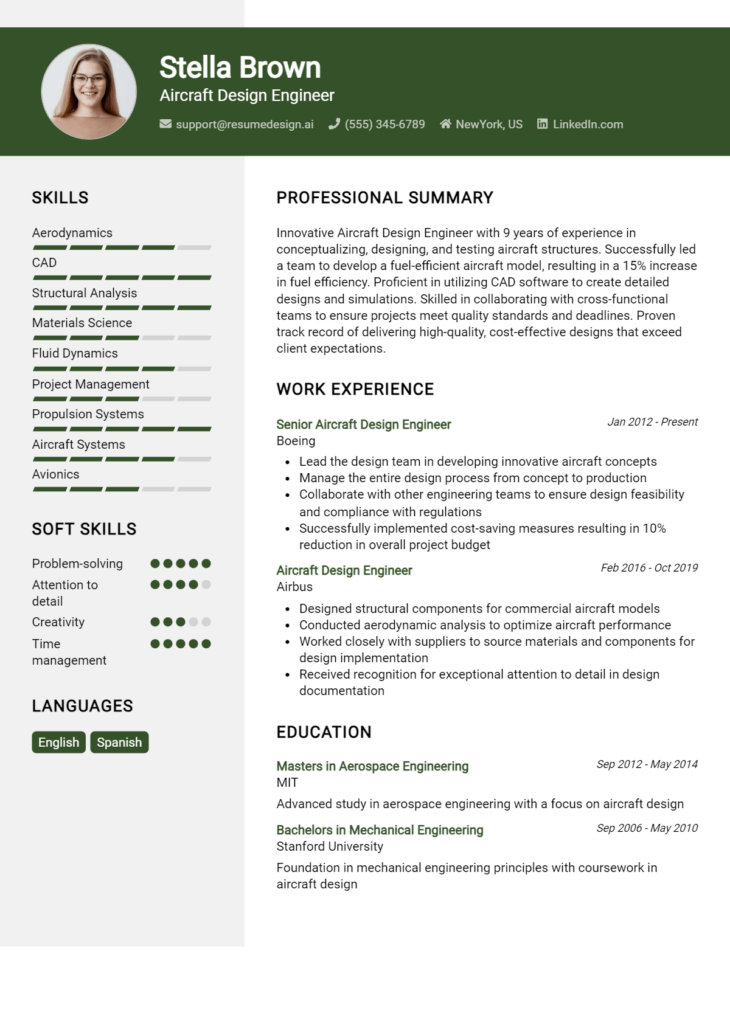Payload Engineer Core Responsibilities
A Payload Engineer plays a crucial role in the design, development, and integration of payload systems for aerospace missions. This position requires strong technical expertise, operational knowledge, and exceptional problem-solving skills to effectively collaborate across engineering, operations, and project management departments. By ensuring the payload meets mission requirements, a Payload Engineer contributes significantly to the organization’s objectives. A well-structured resume highlighting these competencies can effectively showcase their qualifications and readiness for the role.
Common Responsibilities Listed on Payload Engineer Resume
- Design and develop payload systems for various aerospace missions.
- Conduct feasibility studies to assess payload integration into launch vehicles.
- Collaborate with cross-functional teams to ensure payload specifications are met.
- Perform testing and validation of payload systems to ensure performance and reliability.
- Analyze data and troubleshoot issues during the payload development process.
- Prepare technical documentation and reports for payload systems.
- Support launch operations, including pre-launch and post-launch assessments.
- Implement risk management strategies related to payload performance.
- Coordinate with external stakeholders, including vendors and customers.
- Stay updated on industry trends and technological advancements in payload engineering.
- Participate in design reviews and provide technical guidance to team members.
High-Level Resume Tips for Payload Engineer Professionals
In the competitive field of payload engineering, a well-crafted resume is not just a document; it's your first opportunity to make a memorable impression on potential employers. Your resume serves as a powerful marketing tool that showcases your skills, experiences, and achievements, all of which are crucial in demonstrating your value as a Payload Engineer. Given the technical nature of this role, your resume must effectively communicate your expertise and accomplishments in a way that resonates with hiring managers. This guide aims to provide practical and actionable resume tips specifically tailored for Payload Engineer professionals, helping you stand out in a crowded job market.
Top Resume Tips for Payload Engineer Professionals
- Tailor your resume to the job description by incorporating keywords and phrases that align with the specific requirements of the position.
- Showcase relevant experience by highlighting projects or roles that specifically relate to payload engineering, including internships and academic projects.
- Quantify your achievements by using metrics and numbers to demonstrate the impact of your work, such as cost savings, efficiency improvements, or successful project completions.
- Highlight industry-specific skills such as proficiency in CAD software, knowledge of payload integration processes, and familiarity with aerospace standards.
- Include a summary statement that succinctly encapsulates your strengths, career objectives, and what you bring to the role of a Payload Engineer.
- Utilize clear and concise formatting to ensure that your resume is easy to read, with distinct sections for skills, experience, and education.
- Incorporate relevant certifications or training that enhance your qualifications, such as aerospace engineering certifications or specialized software training.
- Use action verbs to describe your responsibilities and achievements, which can add dynamism and clarity to your resume.
- Keep your resume to one or two pages, focusing on the most relevant experiences and skills to maintain the reader's attention.
By implementing these tips, you can significantly enhance your resume and increase your chances of landing a job in the Payload Engineer field. A focused and well-structured resume not only showcases your qualifications but also reflects your professionalism and attention to detail, traits that are essential in this highly technical industry.
Why Resume Headlines & Titles are Important for Payload Engineer
In the competitive field of payload engineering, the importance of resume headlines and titles cannot be overstated. A well-crafted headline serves as the first point of contact between a candidate and a hiring manager, making it crucial for it to be both attention-grabbing and informative. A strong headline can succinctly summarize a candidate's key qualifications, skills, and experience in a single impactful phrase, providing a snapshot of what they bring to the table. It should be concise, relevant, and tailored to the specific job being applied for, effectively setting the tone for the rest of the resume.
Best Practices for Crafting Resume Headlines for Payload Engineer
- Keep it concise: Aim for a headline no longer than 10-12 words.
- Be specific: Tailor the headline to reflect the job description and requirements.
- Highlight key qualifications: Include essential skills or experiences that set you apart.
- Use industry keywords: Incorporate terms relevant to payload engineering to enhance visibility.
- Avoid vague terms: Steer clear of generic phrases that do not convey clear value.
- Make it impactful: Use strong action words and phrases that demonstrate your expertise.
- Focus on results: If possible, indicate outcomes or achievements that underline your capabilities.
- Be authentic: Ensure the headline accurately represents your professional identity and aspirations.
Example Resume Headlines for Payload Engineer
Strong Resume Headlines
Results-Driven Payload Engineer with 5+ Years of Experience in Aerospace Systems
Innovative Payload Engineer Specializing in Advanced Satellite Design and Implementation
Experienced Payload Engineer with Proven Track Record in Mission Success and Team Leadership
Payload Engineering Expert Committed to Enhancing Payload Performance in Space Missions
Weak Resume Headlines
Engineer Seeking Opportunities
Hardworking Professional in Engineering
Payload Engineer
The strong headlines listed above are effective because they not only convey specific skills and experiences but also demonstrate a clear alignment with the expectations of the role. They employ powerful language that communicates confidence and expertise, making a compelling case for the candidate's potential contributions. In contrast, the weak headlines fail to impress due to their vagueness and lack of detail. They do not provide any insight into the candidate’s unique strengths or qualifications, making it difficult for hiring managers to see the value they could bring to the team. A strong, tailored headline is essential for standing out in a competitive job market.
Writing an Exceptional Payload Engineer Resume Summary
A resume summary is a crucial element for a Payload Engineer as it serves as a powerful introduction that quickly engages hiring managers. A strong summary effectively encapsulates key skills, relevant experience, and notable accomplishments that align with the job role. It provides a snapshot of the candidate's professional identity, allowing decision-makers to assess suitability at a glance. A well-crafted summary should be concise, impactful, and meticulously tailored to resonate with the specific requirements outlined in the job description, ensuring that the candidate stands out in a competitive job market.
Best Practices for Writing a Payload Engineer Resume Summary
- Quantify Achievements: Use numbers to demonstrate the impact of your contributions, such as projects completed on time or cost savings achieved.
- Focus on Relevant Skills: Highlight technical skills and competencies that are specifically requested in the job posting.
- Tailor Your Summary: Customize your summary for each application to reflect the unique demands of the role and organization.
- Be Concise: Keep your summary to 2-4 sentences, making every word count.
- Use Strong Action Verbs: Start with powerful verbs that convey your achievements and responsibilities effectively.
- Showcase Problem-Solving Abilities: Highlight instances where you successfully resolved complex challenges in payload engineering.
- Include Industry Keywords: Incorporate relevant terminology from the job description to pass through applicant tracking systems.
- Demonstrate Team Collaboration: Mention experiences working in cross-functional teams, emphasizing your ability to collaborate effectively.
Example Payload Engineer Resume Summaries
Strong Resume Summaries
Dynamic Payload Engineer with over 6 years of experience in aerospace design and integration, successfully leading projects that reduced payload costs by 15% while improving delivery timelines by 20%. Proficient in CAD software and advanced simulation tools.
Results-driven Payload Engineer with a proven track record of optimizing payload systems, contributing to the successful launch of 12 payloads into orbit. Skilled in project management and cross-functional collaboration, ensuring alignment with mission objectives and safety standards.
Innovative Payload Engineer specializing in satellite payload development, with a successful history of managing projects that enhanced system performance by 30%. Experienced in collaborating with engineering teams to achieve design goals and compliance with industry regulations.
Weak Resume Summaries
Experienced engineer looking for a position in payload engineering. I have worked in various engineering roles and have some skills in design.
I am a Payload Engineer with a background in aerospace. I want to find a job where I can use my skills and learn more about payload systems.
The strong resume summaries are considered effective because they provide specific examples of achievements, quantify results, and clearly articulate relevant skills and experiences that directly align with the role of a Payload Engineer. In contrast, the weak summaries are vague and lack measurable outcomes, making it difficult for hiring managers to understand the candidate's qualifications and potential contributions to the organization.
Work Experience Section for Payload Engineer Resume
The work experience section of a Payload Engineer resume is critical as it serves as a testament to the candidate's technical skills, project management abilities, and capacity to deliver high-quality products. This section not only highlights relevant experiences but also demonstrates the candidate's competence in leading teams and collaborating effectively with cross-functional groups. By quantifying achievements and aligning their experience with industry standards, candidates can present themselves as strong contenders in the competitive field of payload engineering.
Best Practices for Payload Engineer Work Experience
- Use action verbs to convey your impact effectively.
- Quantify achievements with metrics such as cost savings, efficiency improvements, or project timelines.
- Highlight technical skills relevant to payload engineering, such as software tools, design methodologies, and compliance standards.
- Emphasize teamwork and collaboration, detailing how you worked with other engineers or departments.
- Focus on specific projects that showcase your ability to solve complex problems.
- Align your experiences with industry standards and trends to demonstrate relevance.
- Tailor your work history to emphasize roles and responsibilities that relate directly to payload engineering.
- Incorporate keywords from the job description to pass through Applicant Tracking Systems (ATS).
Example Work Experiences for Payload Engineer
Strong Experiences
- Led a cross-functional team in the successful design and integration of a satellite payload system, resulting in a 20% reduction in overall project costs.
- Managed the testing and validation of payload components, achieving a 95% success rate in meeting performance specifications during the first phase of deployment.
- Collaborated with software engineers to develop an innovative payload control system, which improved data transmission rates by 30%.
- Coordinated with external stakeholders to ensure compliance with industry regulations, leading to zero compliance issues during audits.
Weak Experiences
- Worked on various engineering projects.
- Assisted in the development of payload systems.
- Participated in team meetings to discuss project updates.
- Helped with testing and analysis of payload components.
The examples of strong experiences are considered effective because they provide specific, quantifiable outcomes, demonstrating a clear impact on projects and showcasing technical leadership and collaboration. In contrast, the weak experiences lack detail and measurable results, making them less compelling and failing to highlight the candidate’s true capabilities and contributions in the field of payload engineering.
Education and Certifications Section for Payload Engineer Resume
The education and certifications section of a Payload Engineer resume is crucial as it showcases the candidate's academic credentials, specialized training, and commitment to ongoing professional development. This section not only highlights relevant degrees and coursework but also emphasizes industry-recognized certifications that validate the candidate's expertise in payload design, integration, and analysis. By providing detailed information about their educational background and any additional qualifications, candidates can significantly enhance their credibility and demonstrate their alignment with the specific requirements of the Payload Engineer role.
Best Practices for Payload Engineer Education and Certifications
- Include only relevant degrees and certifications that align with the Payload Engineer role.
- List the highest level of education first, followed by any additional certifications or specialized training.
- Provide details about relevant coursework that directly relates to payload engineering, such as aerospace engineering or systems integration.
- Highlight any industry-recognized certifications, such as Project Management Professional (PMP) or Certified Systems Engineering Professional (CSEP).
- Keep descriptions concise but informative, focusing on skills and knowledge pertinent to the job.
- Utilize bullet points for clarity and easy readability.
- Update the section regularly to reflect any new qualifications or ongoing education efforts.
- Be mindful of the order of listings, placing the most impressive and relevant qualifications at the top.
Example Education and Certifications for Payload Engineer
Strong Examples
- Bachelor of Science in Aerospace Engineering, University of California, Berkeley
- Master of Science in Systems Engineering, Massachusetts Institute of Technology (MIT)
- Certified Systems Engineering Professional (CSEP), International Council on Systems Engineering (INCOSE)
- Relevant Coursework: Advanced Payload Design, Software Integration for Aerospace Systems
Weak Examples
- Bachelor of Arts in English Literature, State University
- Certification in Basic Project Management (not recognized in the aerospace field)
- Online Course in Creative Writing (irrelevant to engineering)
- High School Diploma, Graduated in 2010
The examples provided are considered strong because they directly relate to the educational and professional requirements necessary for a Payload Engineer, demonstrating both advanced knowledge and industry recognition. In contrast, the weak examples reflect irrelevant fields of study, outdated certifications, and qualifications that do not contribute to a candidate's suitability for the role, thereby undermining their credibility in the competitive aerospace engineering industry.
Top Skills & Keywords for Payload Engineer Resume
A well-crafted resume is essential for a Payload Engineer, as it serves as a vital tool for showcasing both technical expertise and personal attributes. The skills highlighted in a resume not only demonstrate the candidate's qualifications but also their ability to adapt and solve complex problems in a fast-paced environment. Employers look for a combination of hard and soft skills that align with the demands of the role, making it crucial for applicants to present their capabilities clearly and effectively. This blend of skills reflects a well-rounded professional who can contribute to the success of payload integration and management in aerospace projects.
Top Hard & Soft Skills for Payload Engineer
Soft Skills
- Problem-solving
- Communication
- Team collaboration
- Critical thinking
- Attention to detail
- Time management
- Adaptability
- Project management
- Creativity
- Leadership
Hard Skills
- Proficiency in CAD software
- Knowledge of aerospace engineering principles
- Experience with structural analysis
- Familiarity with systems engineering concepts
- Data analysis and interpretation
- Understanding of payload specifications
- Proficient in programming languages (e.g., MATLAB, Python)
- Expertise in testing and validation processes
- Knowledge of regulatory compliance
- Experience with simulation tools
For more guidance on how to effectively showcase your skills and work experience, consider exploring additional resources tailored to resume writing.
Stand Out with a Winning Payload Engineer Cover Letter
Dear [Hiring Manager's Name],
I am excited to apply for the Payload Engineer position at [Company Name], as advertised on [Where You Found the Job Posting]. With a robust background in aerospace engineering and hands-on experience in payload design and integration, I am confident in my ability to contribute significantly to your team. My passion for aerospace technology and commitment to delivering innovative solutions align perfectly with the mission of [Company Name] to advance payload capabilities in the aerospace sector.
In my previous role at [Previous Company Name], I successfully led a team in the design and integration of various payload systems for satellite launches. My responsibilities included conducting detailed analyses to optimize weight and performance characteristics, ensuring compliance with safety and reliability standards, and collaborating closely with cross-functional teams to streamline the integration process. A particular highlight was the successful launch of [Specific Project or Satellite Name], where my team achieved a 15% increase in payload efficiency through innovative engineering solutions. This experience has equipped me with a thorough understanding of the complexities involved in payload engineering, as well as the importance of effective communication and collaboration in a fast-paced environment.
I am particularly drawn to this opportunity at [Company Name] because of your commitment to pushing the boundaries of space exploration and payload capabilities. I am eager to bring my technical skills, problem-solving abilities, and passion for aerospace to your esteemed company. I am excited about the prospect of collaborating with a talented team to develop cutting-edge payload solutions that meet the evolving needs of the aerospace industry. I look forward to the opportunity to discuss how my experience and vision align with the goals of [Company Name].
Thank you for considering my application. I am looking forward to the possibility of discussing my candidacy further and am excited about the opportunity to contribute to the innovative work at [Company Name].
Sincerely,
[Your Name]
[Your Contact Information]
Common Mistakes to Avoid in a Payload Engineer Resume
When crafting a resume for a Payload Engineer position, it's crucial to present your skills and experiences in the best light possible. However, many candidates make common mistakes that can undermine their chances of securing an interview. Avoiding these pitfalls will help ensure that your resume stands out to hiring managers and effectively showcases your qualifications.
Overly Technical Jargon: While it's important to demonstrate your technical knowledge, using excessive jargon can alienate non-technical reviewers. Aim for a balance that conveys expertise while remaining accessible.
Lack of Relevant Keywords: Many companies use applicant tracking systems (ATS) to filter resumes. Failing to include relevant keywords from the job description can result in your resume being overlooked.
Vague Descriptions of Experience: Instead of general statements, use specific examples of your contributions and achievements in past roles. Quantifying your impact (e.g., "improved payload efficiency by 20%") provides clearer evidence of your abilities.
Inconsistent Formatting: A disorganized resume can distract from your qualifications. Ensure consistent formatting in headings, fonts, and bullet points to create a polished and professional appearance.
Ignoring Soft Skills: While technical skills are vital, neglecting to highlight soft skills such as teamwork, communication, and problem-solving can be a mistake. These attributes are essential in collaborative engineering environments.
Omitting Relevant Projects or Research: If you've worked on significant projects or research related to payload engineering, be sure to include them. This demonstrates your hands-on experience and commitment to the field.
Failing to Tailor Your Resume: Sending out a generic resume can be detrimental. Tailor your resume for each application by emphasizing experiences and skills that align with the specific job requirements.
Not Proofreading: Spelling and grammatical errors can create a negative impression. Always proofread your resume or have someone else review it to catch any mistakes before submitting.
Conclusion
As a Payload Engineer, your role is crucial in the design, development, and integration of payload systems for various aerospace missions. Throughout this article, we have explored the essential skills, qualifications, and responsibilities that define a successful Payload Engineer. Key points include the importance of technical expertise in systems engineering, strong communication skills for collaboration with interdisciplinary teams, and a solid understanding of project management principles.
We also highlighted the significance of staying updated with the latest technologies and industry trends, which can greatly enhance your career prospects. As the aerospace industry continues to evolve, the demand for skilled Payload Engineers will only increase, making it essential to present yourself effectively in your resume.
Now is the perfect time to review your Payload Engineer resume to ensure it showcases your skills and experiences accurately. Consider utilizing tools available such as resume templates, which can help you format your resume professionally, and the resume builder for a streamlined creation process. Additionally, exploring resume examples can inspire you on how to effectively present your qualifications. Don’t forget to craft a compelling narrative with the help of cover letter templates to complement your resume. Take action now and give your career the boost it deserves!

